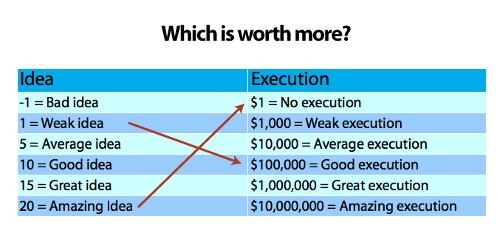
I have a lot of ideas in my head. And for the most part, that’s where they used to stay.
In my head. Where other people couldn’t see them, interact with them or build upon them. Where they were safe and untested and uncriticized. All mine.
Sure, I’ve created some. Some might say I’ve created plenty. But that’s only because they can’t see what I’m not creating. For example, this very post sat dormant for at least a month while I pondered, waited and nitpicked at it.
Because the riskiest, most dangerous and potentially most interesting ideas are the easiest to hold back. I would pin them down like butterflies on a mat, like art at a museum. They were in spreadsheets, in notebooks, on scrap paper around my desk.
And while it might feel creative to think of these ideas, they were dying a lonely death when I wasn’t doing anything with them. They didn’t get their chance to add anything to the world. To affect someone. To spark something.
I lost out, too, with this arrangement. I didn’t push myself to think deeper and harder. I lost out on the feedback or insight or even criticism of others. I missed the chance to discover uncharted territory within myself. I stopped before I could start.
It wasn’t the best life I could give my ideas—or myself.
So I decided to change. To find a way forward, I cataloged all the things that had ever stopped me from creating so I could shoot them down, one-by-one. It turned out to be a helpful exercise, so I thought I’d share.
1. Because the ideas aren’t finished
The No. 1 thing that keeps me from creating is that the idea doesn’t feel complete yet. It lacks something, or I need more examples, or I’m not sure if it’s clear.
A former editor of mine called these “glimmers”—a little spark of an idea, not fully formed but on the cusp of being something. Sometimes you need to let a glimmer sit for a while before it becomes a fully formed idea. Sometimes you can smush it together with a few other glimmers to make something.
The main thing is that idea glimmers need nurturing, which can be hard to do. When ideas are still developing, they can feel embarrassingly incomplete or tough to explain to others. What if my little glimmer is misunderstood or turns out to be nothing at all?
How to fix it:
It may seem counterintuitive, but I’ve learned that this is the time to talk about ideas most, so they can grow from a glimmer to a real idea. You can even post it on social media to give it a quick test. So what if the idea might fail? I’ll be able to get feedback right away and know whether to keep thinking on my glimmer or let it go.
2. Because it’s too hard
Although I’ve been writing most of my life, it never exactly comes easy to me. Occasionally the words flow, but more often it feels like a struggle to pull them out of me.
And sometimes I don’t want a struggle. Sometimes I want to lay around and watch Orange Is The New Black.
As the incomparable wit Dorothy Parker put it, “I hate writing. I love having written.”
How to fix it:
The best fix I’ve discovered here is simply to start. Start somewhere, anywhere. As soon as I put down an outline, a headline, or even one sentence of the piece, the rest begins to flow much more easily. You can also do this with a timing structure. Close down all the distractions and force yourself to focus on just 20 minutes (or whatever time period feels right to you) of writing and no more. The bite-sized task can jumpstart your focus for the bigger project.
3. Because I’m focusing too much on other people’s stuff
I’ve always loved reading. And there’s really never been a better time to be a passionate reader. I get great stuff all day every day from my Twitter stream, my gazillion RSS feeds and the newsletters in my inbox, plus there’s the Sunday Times (yup, I still get a printed paper), everything I haven’t quite gotten to yet on Pocket and the many books on my Kindle.
Nothing makes me happier than spending time reading great stuff.
But if I’m not careful, it can also paralyze me into thinking all the good ideas are taken and all that needs to be said already has been. It’s kind of like a specific, content marketing version of Imposter Syndrome.
How to fix it:
There’s always going to be space for reading, curating and cheering on others’ work. But there should also be a space for building on it and creating stuff of one’s own. Each of us has something to say, and we have the responsibility and privilege of adding to the discourse. It’s up to us to find and nurture the right balance and feel inspired by—not intimidated by–the work that others do. After all, everything is a remix.
4. Because I’m too busy with other work
Even as I type those words I realize what a flimsy excuse they are. Sure, I have lots to do at work and at home. We all do. But you always make time for what’s important to you, one way or another. I could wake up earlier or stay up later. I could cut out all TV. We all have the same number of hours in the day—it’s up to us to use them the best way we can to achieve our goals.
How to fix it:
What I discovered about feeling too busy for writing is that this is generally a symptom of needing to readjust my priorities to make sure creating doesn’t fall too far down the list. The things that have worked the best for me so far are to block out time in my schedule for creative work. I can write on the weekends, or in the morning before I check my email. If it turns out I’m really and truly too busy to execute an idea, I can always give it away to someone who has time to take it on. Because in the end, it’s more about the idea than it is about me.
5. Because I get distracted
From the time I decided to write this until the time I finished it, I did the following: Walked the dog, ate breakfast, thought about searching Amazon for a new rug, checked Twitter, read two articles. And that’s me on a really focused day. Distractions are always going to be present—that’s the world we live in.
How to fix it:
I’ve been experimenting with a lot of different ideas to help me here. The best solutions so far keep me focused by creating artificial pressure: setting a timer that goes off every 30 minutes, creating a deadline (either real or self-imposed), working until the power runs out on my laptop. I also try to realize the difference between productive distraction (walking the dog often leads to new ideas or “writing in my head”) and non-productive distraction, like idly checking Facebook and Twitter.
6. Because I’m afraid
Now we get to the big one—the real reason that underlies all these others. The biggest reason my ideas used to live only in my mind instead of out in the world is that I was afraid they might not be good enough, unique enough or novel enough.
In essence: I’d rather abandon an idea, bury it forever, than have it potentially fail on me.
Possibly an understandable instinct, but a misguided one for sure–especially when you think of it like this:

Execution is what makes things happen–not pristine, flawless ideas.
Not to mention, if I thought about everything in my life the way I used to think about ideas, I’d be missing out on some pretty amazing experiences. Risk is what makes life interesting.
Luckily, Buffer’s culture creates an incredibly safe space for ideas and thoughts from every team member. Here, I’ve learned to share early and often and to offer and receive feedback with a positive spirit. It has made all the difference. You can do the same by finding a group of peers or a mentor with whom you can practice growing more comfortable sharing around.
How to fix it:
I still haven’t entirely cracked the code on this one, but writing this post is a beginning. Here’s what I’m trying right now:
Getting comfortable with sharing ideas—both my good and not-so-good ones—isn’t something that happened overnight. It’s a daily practice that I’m still working on and probably will be for some time. I’ve learned that the comfort zone is a nice place to visit, but being uncomfortable is where things really get exciting.
This article originally appeared on Buffer.
More from Buffer:
More Must-Reads from TIME
- Donald Trump Is TIME's 2024 Person of the Year
- Why We Chose Trump as Person of the Year
- Is Intermittent Fasting Good or Bad for You?
- The 100 Must-Read Books of 2024
- The 20 Best Christmas TV Episodes
- Column: If Optimism Feels Ridiculous Now, Try Hope
- The Future of Climate Action Is Trade Policy
- Merle Bombardieri Is Helping People Make the Baby Decision
Contact us at letters@time.com